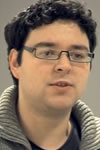Ask me a question!
What were the main 'career decision' milestones in your life so far?
Choosing to do engineering in college was the first major milestone. From there my course divided into different sections and the decision became more about personal preference and ability rather than subject aptitude. The decision to do engineering in school was majorly based on my strengths in science and maths.
Who are the people who most influenced your career direction?
How did you go about getting your current job?
Describe a typical day?
No day is ever the same in Intel as the challenges we face are constantly changing. Essentially my day-to-day role is to sustain a manufacturing process which allows equipment to operate in a safe and effective manner, while producing top of class, defect free products.
A typical day begins with arriving on site in Leixlip at 6:30am and heading into the cleanroom for shift passdown. Production in Intel is carried out in a super clean environment, which means that employees have to wear what we call bunny suits in order to maintain a certain level of cleanliness, which is 10,000 times cleaner than an operating theatre. Passdown involves both engineers and technicians and is where any issues and progress over the last 12 hours is discussed.
It is the role of the engineer to lead this passdown and ensure that tool operations and plans can continue as they had for the previous 12 hours. This is vital to maintain the status of excellence which is required to allow 24 by 7 manufacturing succeed in Intel.
At 8:30 am there is a second passdown meeting again led by the shift engineer. This meeting involves tool owners, Equipment engineers, team leaders and other people who are vital in running a manufacturing process. Here the tool plans for any maintenance or experiments and the goals for the day are decided amongst the team. It is the shift engineer’s role to decide on the priority of these tasks and communicate them to the team of technicians who operate the machines.
Throughout the day the engineer takes responsibility for ensuring these plans are completed and communicating the advancement of plans to team leaders and tool owners.
Another major part of everyday operations is monitoring and maintain a low defect performance. This involves monitoring inline defect data to ensure tools are consistently producing the best standard products.
Training is also a huge part of my day in Intel. As a new hire in the company I typically have classes to attend, Web based training to complete and spend time with experienced engineers in order to develop my skill set for the job.
What are the main tasks and responsibilities?
What are the main challenges?
What do you like most?
Is there anything that isn't great?
What particular skills do you bring to your workplace?
What subjects did you take in school and how have these influenced your career path?
Physics, Biology, Higher level maths. I think physics and maths played a huge role in influencing my career decisions. Physics allowed me to develop an interest in understanding how things work and what the practical limitations on designs are. While maths allowed me to develop the logical thinking and problem solving skills which are essential to engineers in their every day jobs.
What is your education to date?
What aspects of your education have proven most important for your job?
What have been the most rewarding events in your career so far?
What personal qualities do you have that helps you in your career?
The ability to work as part of a team and communicate well with others is one of the skills I utilise most in the working environment. I honed these skills over my years in school playing sports for multiple clubs and participating in many school societies. I was also elected head girl in my final year of secondary school. This greatly improved my team management skills as I was the team leader for our team of prefects and also represented the school at many events.
Does your job allow you to have a lifestyle you are happy with?
What advice would you give to someone considering this job?
Engineering in general is an extremely broad career and can lead to you many different applications and many different parts of the world. It’s also a career which can give you a set of skills highly adaptable to other careers. In Intel the same applies. Day to day the job changes so being able to change with the job is important. Make sure you are adaptable and can apply your skills in many different situations.
What are the three most important personal characteristics required for the job?
The ability to work as part of a team is huge in Intel. Having the skills to communicate efficiently and lead a team are vital traits for the job and are implemented almost every day. A developed set of problem solving skills and ability to design simple, effective solutions to everyday problems is something that you’ll use in any engineering job whether in Intel or not. Being self-motivated and driven is also vital to advancing in Intel as an engineer. It’s up to you to get your work done and meet deadlines, which is a nice change from college where you have people.
Have you undertaken, or do you plan to undertake any further training as part of your job?
What kinds of work experience would provide a good background for this position?
If as an engineering graduate you have no experience in an eng company, it’s not something to worry about. I had never worked in a company before Intel. Most engineering companies are looking for a skill set that they require and will then train you into the specific role that they envision for you. It’s important to show what skills your course has taught you.
- Career Development?
- Current Job?
- Education and Training?
- Personal Qualities?
- Advice for Others?








